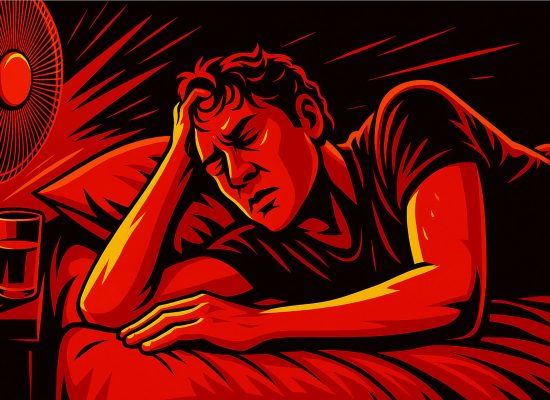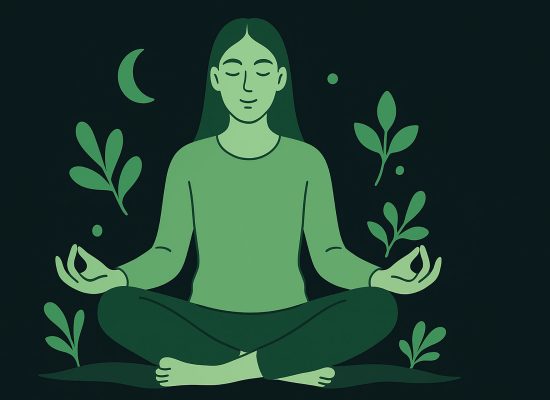Have you ever found yourself staring at the ceiling, exhausted but unable to sleep? You’re not alone. Millions of people deal with sleep disorders like insomnia, and it’s no surprise—our lives are busier than ever. The good news? It’s possible to overcome sleep disorders naturally, without reliance on prescription medications. These days, more people are searching for how to cure insomnia naturally without side effects or long-term dependency.
Table Of Content
Natural remedies are becoming popular as more people seek sustainable and holistic solutions. This guide explores evidence-based methods to help you prevent sleep disorders, cure insomnia, and improve sleep quality naturally. Whether it’s occasional sleeplessness or chronic insomnia, these insights will empower you to reclaim restful nights.
Understanding Common Sleep Disorders
Sleep disorders encompass various issues, each affecting sleep uniquely:
- Insomnia: Difficulty falling asleep or staying asleep throughout the night.
- Sleep Apnea: Breathing repeatedly stops and starts during sleep.
- Restless Legs Syndrome (RLS): An uncontrollable urge to move your legs, disrupting sleep.
- Narcolepsy: Excessive daytime sleepiness and sudden attacks of sleep.
- Circadian Rhythm Disorders: Disruption in your body’s internal clock, making sleep patterns irregular.
Signs You Might Have a Sleep Disorder
Wondering if what you’re experiencing counts as a sleep disorder? Common signs include trouble falling asleep, frequent waking during the night, waking up feeling exhausted, or struggling to stay awake during the day. If this resonates, it might be time to explore natural remedies that can help you prevent sleep disorders before they become chronic.
Why Choose Natural Remedies to Overcome Sleep Disorders?
Prescription medications for sleep can seem appealing, but they’re not a long-term solution. These drugs often carry risks like dependency and unwanted side effects. Natural remedies, on the other hand, address underlying issues such as stress and poor sleep hygiene. When you choose natural methods to cure insomnia, you’re investing in a sustainable, holistic approach to wellness that promotes lasting improvement. From mindful practices to dietary changes, these natural remedies for insomnia empower you to take control of your sleep in a sustainable way.

Natural Remedies for Insomnia and Other Sleep Disorders
1. Overcome Sleep Disorders with Meditation
Meditation is one of the most effective ways to overcome sleep disorders naturally. Research published in JAMA Internal Medicine highlights that mindfulness meditation significantly improves sleep quality and helps reduce insomnia symptoms.
Incorporating meditation, particularly mindfulness or guided sleep meditation, into your evening routine prepares your mind and body for restful sleep. Apps like Siddha Meditate can help you build meditation habits seamlessly into your daily schedule, ensuring consistent, better-quality sleep. Whether you’re just beginning or trying to overcome sleep disorder symptoms that have lingered for years, incorporating meditation regularly can be a turning point. For a seamless transition from wakefulness to sleep, the Drift into Sleep meditation guides you through a deeply relaxing process, helping your mind and body surrender to rest.
2. Establishing a Sleep-Friendly Routine
Our bodies thrive on consistency. Going to bed and waking up at the same times—even on weekends—can dramatically enhance your sleep quality. Try creating a relaxing bedtime ritual that signals to your body it’s time to wind down. This routine could include reading, meditation, or gentle stretching.
Consistency doesn’t just help you fall asleep faster; it also helps you prevent sleep disorders by regulating your internal clock and reducing sleep disruptions. Building a consistent nighttime meditation habit can make all the difference. Explore the Pre-bed Meditation for Sleep collection for guided meditations designed to help you unwind and ease into sleep effortlessly. By developing a sleep routine supported by meditation, you can overcome sleep disorder patterns and strengthen your body’s natural rhythm.
You can also read “Screen Time and Sleep: How to Reduce Blue Light and Improve Your Rest“
3. Mindful Breathing and Progressive Muscle Relaxation (PMR)
If stress and anxiety keep you awake, mindful breathing and Progressive Muscle Relaxation (PMR) can be game-changers. PMR involves systematically tensing and relaxing muscles from head to toe, significantly reducing physical tension. A recent study confirms that practicing PMR regularly can lead to meaningful improvements in sleep for those suffering from insomnia.
Combine PMR with slow, mindful breathing exercises to maximize relaxation, helping you effortlessly drift into restful sleep. try the guided Progressive Muscle Relaxation for Evening session, which helps release tension and gently prepares your body for deep sleep.

4. The Role of Diet in Sleep Quality
Believe it or not, what you eat profoundly affects your sleep. Foods high in magnesium and melatonin, such as almonds and cherries, naturally encourage restful sleep. Meanwhile, caffeine, sugary foods, or heavy meals can disrupt sleep patterns and make insomnia worse.
Making mindful dietary choices, especially in the evening, can help you prevent sleep disorders and significantly improve your overall sleep quality.
5. Herbal and Natural Supplements to Cure Insomnia Naturally
Natural supplements like melatonin, valerian root, lavender oil, and chamomile tea are widely recognized as effective natural remedies for insomnia. Melatonin, for instance, can reset your sleep-wake cycle naturally, making it a popular choice for people struggling with insomnia or jet lag.
For those wondering how to cure insomnia naturally, these herbal aids offer gentle yet effective support. Always consult your healthcare provider before starting new supplements, but rest assured that when used appropriately, these natural options can safely enhance your sleep.
6. Physical Activity and Exercise
Regular exercise does wonders for sleep quality. Studies consistently show that people who engage in daily physical activity fall asleep faster and enjoy deeper sleep. But timing matters—try exercising earlier in the day, as exercising too close to bedtime may energize rather than relax you.
Whether it’s yoga, walking, or swimming, staying physically active is a reliable way to naturally overcome sleep disorders and enhance overall wellness.

7. Environment and Sleep Hygiene Improvements
Your bedroom environment greatly influences sleep quality. Creating a quiet, dark, cool, and comfortable space can dramatically improve your ability to fall asleep. Reducing screen time at least 30 minutes before bed and limiting exposure to blue light can also significantly enhance sleep.
Investing in better sleep hygiene practices and creating a sleep-friendly environment is an easy yet effective method to naturally cure insomnia and sleep better consistently. Pairing these habits with mindful awareness can also help prevent sleep disorders from forming or returning over time.
8. Hydration and Sleep
Maintaining proper hydration is essential for overall health and plays a significant role in sleep quality. Dehydration can lead to discomforts such as dry mouth, headaches, and muscle cramps, which may disrupt sleep and contribute to sleep disorders. Ensuring adequate fluid intake throughout the day can help prevent these issues and promote restful sleep.
However, it’s important to balance hydration to avoid frequent nighttime awakenings due to the need to urinate. To achieve this, focus on consuming the majority of your daily fluids during the morning and afternoon. Limiting fluid intake in the hours leading up to bedtime can reduce nighttime disruptions, supporting better sleep quality. By managing your hydration habits, you can effectively prevent sleep disorders and enhance overall well-being.
9. Alternative Therapies: Acupuncture and Acupressure for Sleep Disorders
For those seeking additional natural remedies for insomnia, acupuncture and acupressure may offer relief. These traditional practices focus on stimulating pressure points in the body to balance energy flow. Research has shown that acupuncture can enhance melatonin production and reduce anxiety, both of which are essential for improving sleep quality. Acupressure, a non-invasive alternative, can be practiced at home and has been linked to reductions in sleep latency and nighttime awakenings.
Incorporating these therapies alongside daily meditation and sleep-friendly routines can offer a holistic approach to curing insomnia naturally. While more research is ongoing, many people report improved sleep after regular sessions. If you’re curious about alternative methods that support your nervous system and promote relaxation, these therapies are worth exploring.
Prevent Sleep Disorders Before They Start
The best way to overcome sleep disorder challenges is to stop them before they begin—prevention starts with awareness, routine, and tools that support your body and mind. Prevention truly is better than cure, especially with sleep disorders. By proactively managing stress, integrating meditation into your daily routine, and maintaining a consistent sleep schedule, you reduce the chances of sleep disturbances occurring.
Regular meditation practice, particularly through habit-building apps like Siddha Meditate, equips you with tools to naturally prevent sleep issues and maintain long-term restful sleep.
The Role of Technology: Sleep Tracking and Biofeedback
Technology, when used mindfully, can help you prevent sleep disorders by offering deeper insights into your sleep patterns. Devices like wearable trackers and smart watches monitor sleep cycles, heart rate, and restlessness, helping you identify what’s affecting your rest. With this data, you can make informed lifestyle adjustments—from your evening caffeine cut-off time to the optimal hour to start winding down.
Biofeedback tools take it a step further by training you to control physiological functions like breath and heart rate, leading to improved relaxation before bedtime. Combine this with the calming guidance of Siddha Meditate’s evening sessions, like Winding Down Before Bed Ritual, and you’ll be able to use both internal awareness and external tools to naturally overcome sleep disorders and restore balance to your nights.
Sleep disorders can leave you feeling exhausted and frustrated, but natural remedies offer genuine, lasting solutions. By embracing practices like meditation, improving your sleep environment, and making mindful lifestyle choices, you can effectively overcome sleep disorders naturally and wake up energized.

Remember, better sleep begins with small, consistent steps. The Siddha Meditate app offers a habit-building approach to better sleep with expertly guided sleep meditation classes designed to help you unwind, relax, and truly rest. Whether you’re dealing with insomnia, racing thoughts, or simply need a peaceful way to end your day, our sessions—like meditation for sleep routine, progressive muscle relaxation, and gratitude before bed—fit seamlessly into your nightly routine. Try out our free classes today and discover how meditation can help you overcome sleep disorders naturally and wake up feeling truly refreshed.
FAQs about How to Overcome Sleep Disorders
1. What are effective natural remedies for insomnia?
Natural remedies for insomnia include mindfulness meditation, a consistent sleep routine, and improving your sleep environment. Eating melatonin-rich foods and reducing screen time before bed can also help prevent sleep disorders naturally.
2. How can I overcome sleep disorder with meditation?
To overcome sleep disorder with meditation, try guided sleep sessions like those on Siddha Meditate. They calm your mind, reduce stress, and help your body relax into deeper, better-quality sleep.
3. How to cure insomnia naturally with lifestyle changes?
You can cure insomnia naturally by combining healthy sleep habits with calming practices like meditation, light evening meals, and regular exercise. These changes work together to prevent sleep disorders and support long-term rest.
4. Are there alternative methods to overcome sleep disorders?
Yes. Acupuncture, acupressure, and daily meditation offer effective ways to overcome sleep disorder without medication. They relax the nervous system and improve sleep over time—naturally.







